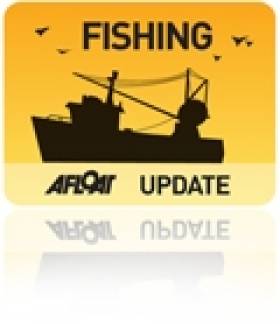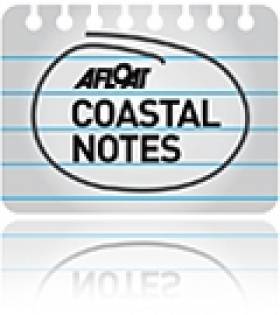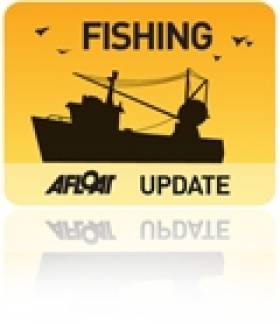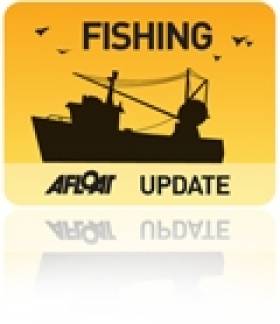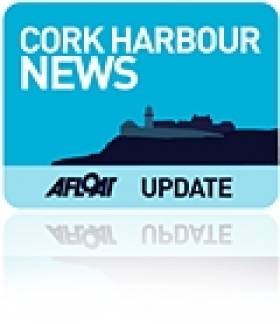Displaying items by tag: Minister for the Marine
Minister 'Voted To Allow Spain to Overfish Irish Waters'
#FISHING - Marine Minister Simon Coveney has been accused of "hypocrisy" by supporting subsidies for modernising Europe's fishing fleets despite his previous opposition to overfishing.
The Sunday Times reports that Minister Coveney signalled his backing for new subsidies that would allow European fishermen to modernise their trawlers at a meeting to discuss reform of the Common Fisheries Policy recently.
However, environmental groups argue that such subsidies would be used by bigger fishing countries like France and Spain to exploit already dwindling fish stocks in Irish waters.
"Coveney and his advisers made a number of strategic mistakes in supporting the continued payments of subsidies to Europe's fishermen," said Markus Knigge, a consultant with environmental lobby group Ocean 2012.
"The Spanish are the main beneficiaries and they will use part of this money to improve their fleet, which will enter Irish waters and catch even more fish and deplete Irish stocks. Ireland really voted to allow Spain to overfish its waters."
Knigge said Minister Coveney's position on the matter was a U-turn on his previous commitment to end the practice of discarding fish at sea.
An agreement reached by Europe's fisheries ministers this summer was criticised as "vague" by environmental groups and 'fish fight' campaigners.
Meanwhile, Ebbie Sheehan of the Irish Fishermen's Organisation said that what Irish fishermen really needed was not subsidies but permission to land the fish they catch, instead of being forced to discard fish when they go over quota.
New Harbour Charges Could End Trips to See Fungie
#IRISH HARBOURS - "Draconian" new charges for harbour users could bring an end to boat trips to see Dingle's most famous resident, according to The Irish Times.
Fungie the dolphin has been a mainstay of Dingle harbour for almost 30 years, but boat trips to visit him could cease to operate "with immediate effect" if charges of up to €9,000 are imposed "in advance" of the season.
Currently operators in the Dingle Boatmen's Association pay around €2,500 to use the harbour at the end of each season.
Association chairman Jimmy Flannery called on anyone working in tourism in Ireland to make submissions to the public consultation before the deadline next Friday 20 April.
As previously reported on Afloat.ie, yacht owners are also up in arms over the new charges proposed by Marine Minister Simon Coveney that could see their rates hiked by an incredible 800 per cent.
And the news comes not long after fellow Kerry harbour users protested proposed new bylaws to regulate their activities and impose new charges.
Massive Fee Increases Proposed for Harbour Yacht Berths
#IRISH HARBOURS - Yachts berthing at Ireland's main fishing harbours could see their charges hiked by an incredible 800 per cent.
According to The Irish Times, Marine Minister Simon Coveney has announced a mere 21 days for comment and consultation on the draft Fishery Harbour Centres (Rates and Charges) Order 2012. The consultation document is attached to the bottom of this post and available to download as a pdf.
The proposed new charges include an annual fee of €250 per metre for yachts, which could see a 10-metre yacht currently paying €312 a year for a berth shell out as much as €2,500 annually for the same space.
Additional water and electricity costs could even see this bill rise to €3,100 - for berths that come "without proper marina facilities in most cases".
The proposals apply to the State's six fishery centres at Killybegs, Rossaveal, Dingle, Castletownbere, Dunmore East and Howth, only two of which have pontoons suitable for leisure boats.
The Irish Times has more on the story HERE.
Donegal Marine Stakeholders Encouraged Over Integration Plan
#NEWS UPDATE - A Donegal TD is encouraging the county's marine stakeholders to submit suggestions for the Government's upcoming Integrated Marine Plan, as previously reported on Afloat.ie.
The plan, which will be published in the summer, "will be a national agenda for developing our country’s marine potential, across tourism, shipping, leisure, fisheries and other sectors," said Joe McHugh TD.
The Dáil deputy noted "it is significant" that Taoiseach Enda Kenny and Minister for the Marine Simon Coveney are "dealing with this personally" as "previous Governments did not give this type of prioritisation to the industry".
He added: “I encourage Donegal marine stakeholders who see potential for national development in the fisheries industry, sea tourism, marine leisure, oil production, renewable energy production, deep sea fisheries and in various other areas to make submissions to the Integrated Marine Plan."
More information on the Integrated Marine Plan can be found at www.oceanwealth.ie.
Meeting for Bantry Bay Fish Farm Opponents Tonight
#COASTAL NOTES - Bantry Bay has reached its capacity for salmon farming, says the committee formed to oppose a proposed new facility at Shot Head.
Save Bantry Bay has called a public meeting for supporters tonight (24 March) at Eccles Hotel in Glengarrif, Co Cork, starting at 8.15pm - where chairman Kieran O'Shea will give a presentation on the group's "wide-ranging objections", as The Fish Site reports.
Minister for the Marine Simon Coveney is currently considering the licence application for Marine Harvet's proposed salmon farm at Shot Head in Adrigole.
Concerns among the committee's members include the potential spoiling of the area's natural beauty having a knock-on effect on tourism, and the environmental consequences of algae blooms from nitrogen and phosphorous waste.
Local fisherman fear that a fish farm of more than 100 acres would see the closing off of part of an "important ground for shrimp and prawn".
Possible infection of wild salmon in local river systems by sea lice from farmed salmon is also an issue, with the Environmental Impact Statement for Shot Head highlighting an outbreak of lice at Marine Harvest's facility in Roancarrig two years ago.
The Fish Site has more on the story HERE.
- Coastal Notes
- Fishing
- Bantry Bay
- Co Cork
- fish farm
- salmon farm
- Shot Head
- Adrigole
- Glengarrif
- Eccles Hotel
- Save Bantry Bay
- Minister for the Marine
- Simon Coveney
- Marine Harvest
- tourism
- environment
- algae blooms
- nitrogen
- phosphorous
- waste
- shrimp
- prawn
- infection
- Wild Salmon
- sea lice
- environmental impact statement
- Roancarrigh
Make or Break Time for Fish Discards Ban
#FISHING - The Guardian reports that an alliance of EU member states plans to "hijack" a council meeting of the union's fisheries ministers today to prevent a ban on fish discards.
EU maritime affairs commissioner Maria Damanaki has stated her commitment to ending the practice, describing it as “unethical, a waste of natural resources and a waste of fishermen’s effort.”
Half of all fish in the North Sea - and up to two-thirds in other areas - are thrown back under the quota system implemented under the EU's common fisheries policy. The practice was recently highlighted by TV chef Hugh Fearnley-Whittingstall's 'Fish Fight' campaign.
Minister for the Marine Simon Coveney has called on EU states to support Ireland's effort to deal with fish discards, as previously reported on Afloat.ie.
But some member states, led by France and Spain, have dismissed the proposed ban as "unrealistic" and "too prescriptive", and will attempt to pass a declaration to allow the practice to continue indefinitely.
According to the Guardian, the charge is being led by industrial-scale fishing enterprises who want to retain the permission to discard lower value fish in order to maximise profits.
Brussels insiders say that if the declaration were to pass it would "kill the reform".
Irish Skipper Expo Visitor Numbers 'Exceed Expectations'
#FISHING - The 2012 Irish Skipper Expo has been hailed by organisers as the most successful to date, as World Fishing reports.
Over 100 companies displayed their products and services to more than 4,500 visitors from the fishing industry and retail and catering sectors at the Skipper Expo International 2012, held at the Galway Bay Hotel on 24-25 February.
As previously reported on Afloat.ie, Marine Minister Simon Coveney was on hand to launch a new initiative promoting the use of selective fishing nets, and he was full of praise for the weekend-long exposition.
“I am very impressed by the scale and expanse of this event which showcases a wide range of products and services for the fishing industry," he said. "While visiting the stands, I was able to meet and discuss with fishermen current issues and also get a good understanding of the latest developments and innovations in their industry.”
Sharon Boyle, event manager at organisers Mara Media Ltd, added: "The support from the industry continues to be very strong for this show and the number of visitors during the two-day event once more exceeded expectations in what was a very busy weekend.
"Dates for next year’s show are 1-2 March, being held once more at the Galway Bay Hotel.”
Fishing Industry Welcomes Selective Nets, Grant Aid at Irish Skipper Expo
#FISHING - Minister for the Marine Simon Coveney briefed the Irish Skipper Expo in Galway last weekend on a new initiative promoting the use of selective conservation fishing nets, which allow young fish to escape.
Under the initiative in the Celtic Sea, additional quotas of up to 25% will be made available by the minister to skippers of Irish fishing boats which use an escape panel in their nets, allowing young whiting and haddock to escape.
The escape panel, developed by the Irish industry, has been endorsed at EU level and is expected to be a mandatory requirement later in the year.
Minister Coveney said on Saturday: “The use of this panel will significantly reduce discards of juvenile whiting and haddock in the Celtic Sea, allowing juvenile fish to grow and mature and contribute to increased stock size and returns for fishermen in future years.
"I believe that this offers an example of a practical approach to dealing effectively with the discards problem and retention of a flexible quota allocation system that we should take forward in the context of the Common Fisheries Policy Review."
In other news, Bord Iascaigh Mhara (BIM) announced €1.5 million in grant aid for the Irish fishing industry at the expo.
A spokesperson for BIM confirmed to the Galway Independent that the funding will be available to industry through a variety of schemes including fleet safety, seafood environmental management, lobster V-notching and coastal action groups.
Over 100 companies displayed their products and services to fishermen at the Irish Skipper Expo International 2012, held at the Galway Bay Hotel on 24-25 February.
- Fishing
- commercial fishing
- Minister for the Marine
- Simon Coveney
- Irish Skipper Expo
- Skipper Expo International
- 2012
- Galway Bay Hotel
- Galway
- conservation
- selective
- quota
- Celtic sea
- initiative
- discards
- grant aid
- Bord Iascaigh Mhara
- BIM
- Funding
- Coastal
- Seafood
- whiting
- haddock
- juvenile fish
- Common Fisheries Policy
Minister Launches Consultation on Harnessing Ireland's Ocean Wealth
#NEWS UPDATE - Minister for the Marine Simon Coveney has launched a public consultation process on harnessing the potential of Ireland's vast marine resources.
Our Ocean Wealth is calling for input into how Ireland can best capitalise on the trillion-euro global market for marine products and services, from seafood and tourism to shipping, oil and gas, renewable ocean energy and marine science.
Launching the consultation, Minister Coveney said: "We need to change the way we in Ireland think about the sea and look for new opportunities to harness the potential of our 220-million-acre marine resource.
"This government is determined to generate the momentum to drive forward a new era of sustainable economic development across the maritime sectors - we must avail of these opportunities to assist in our recovery. We want your help to shape our plan, to shape our future and to assist in our drive towards our nation's economic recovery."
The consultation process is a step towards developing an Integrated Marine Plan for Ireland intended to grow the percentage of GDP generated by the country's marine resource, which covers an area 10 times the size of Ireland's land mass.
The minister added: "We need an Integrated Marine Plan to harness our ocean wealth, get the environment right for investment and use the potential of our marine economy to create jobs in a sustainable manner."
The consultation phase will be open until 31 March with an aim to publish the Integrated Marine Plan during the summer. For more details visit www.ouroceanwealth.ie.
Haulbowline Toxic Waste Site Will Be Cleaned Up by 2014 Says Govt
#CORK HARBOUR - The Government has finally set a deadline for the clean-up of the toxic waste site on Haulbowline Island in Cork Harbour, under threat of massive fines from the European Commission.
RTÉ News reports that a two-and-a-half year deadline has been set to complete the sanitation of the illegal dump on the island at the site of the former Irish Steel/Ispat plant.
Some 500,000 tonnes of waste, including toxic heavy metals and cancer-causing materials, have been blamed for the area's notoriety in having one of the highest cancer rates in Ireland.
As previously reported on Afloat.ie, in October last the Government signed off on a €40m package to begin clean-up of the toxic waste site on the island.
In an editorial yesterday, the Irish Examiner welcomed the Government's decision, but emphasised it was long overdue.
"[It] cannot dispel the great frustration that it has taken so very long to do what should have been done years ago," the paper said.
"To this day nobody has explained how an illegal dump of this scale was allowed to develop on a site that is not exactly secluded, remote or out of the public eye - it is, after all, just next door to the country’s main naval base."
The Irish Examiner also reports on worries that the toxic waste may never be fully removed from the island, but rather sealed off and made impermeable.
Minister for the Marine Simon Coveney was quoted as saying: "This whole clean-up plan will be peer reviewed so it’s best practice but it could be better to contain the material onsite rather than remove it.
"We will be doing all that is reasonable to ensure the site is safe."


























